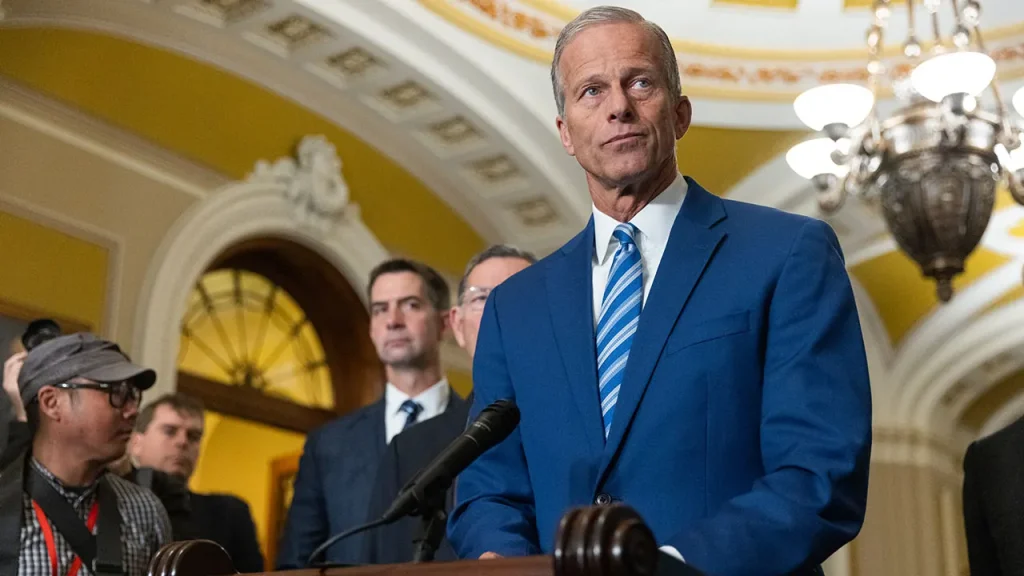Listen to the article
Senate Braces for Weekend Session as Government Shutdown Impasse Continues
The Senate is heading into a rare weekend session as lawmakers struggle to find a path forward to end the ongoing government shutdown, now in its 39th day.
Behind closed doors, Senate appropriators are preparing a package of three spending bills to attach to the House-passed continuing resolution (CR), along with an extension that would reopen the government until either December or January. However, uncertainty remains about whether this revamped funding package will receive a floor vote on Saturday.
Senate Majority Leader John Thune (R-S.D.) indicated his desire to keep lawmakers in Washington until the shutdown ends, canceling a planned week-long Veterans’ Day recess. “I’ve been talking all morning with some of the folks that are involved with the meeting, and I think we’re getting close to having it ready,” Thune said. “We just need to get the text out there.”
The political dynamics have shifted significantly following Tuesday’s elections, with Senate Democrats emboldened by their party’s electoral victories. Senate Minority Leader Chuck Schumer (D-N.Y.) and his caucus have rejected previous Republican proposals and unveiled their own plan that would extend Affordable Care Act (Obamacare) subsidies for one year while creating a bipartisan working group to negotiate next steps after government reopening.
Republican leadership immediately dismissed the Democratic counter-proposal, with Thune calling it a “non-starter.” The impasse has sparked sharp rhetoric from both sides.
Senator Eric Schmitt (R-Mo.) threatened to appeal directly to President Donald Trump to cut funding from what he termed “pet projects” in Democratic-led states and cities to pay federal workers during the shutdown. “The idea that you’ve got a bunch of kamikaze pilots trying to burn this whole place down because they’re emboldened by an election where Democrats won in Democrat areas is totally insane,” Schmitt said.
Schumer defended his caucus’s proposal: “I know many Republicans stormed out of the gate to dismiss this offer, but that’s a terrible mistake.” Throughout the shutdown, Senate Republicans have maintained they would only address healthcare subsidies after government operations resume, offering Democrats a vote on healthcare legislation once funding is restored.
Senator Mark Kelly (D-Ariz.) was unsurprised by the Republican rejection, suggesting, “They don’t want to help people with their healthcare.” Republicans countered that a simple extension of the enhanced subsidies, which were modified during the COVID-19 pandemic under former President Joe Biden, would primarily benefit insurance companies rather than consumers.
Senator Katie Britt (R-Ala.), who has engaged in cross-aisle discussions on potential solutions, criticized the Democrats’ focus on Obamacare subsidies: “Since Obamacare came into effect, look, who’s gotten rich? It’s not the people. They’re talking about the people’s premiums and have… they taken it to the companies that are actually making the money off of it? They’re not.”
Democratic Senator Chris Murphy (D-Conn.) expressed frustration at the standoff, noting that some in his caucus had pushed for a multi-year extension or more comprehensive healthcare measures. “We made a really simple, really scaled-down offer that could get the government up and operating and [is] really good for them politically,” Murphy said. “I just still don’t understand why they won’t accept the offer.”
The shutdown’s effects continue to spread across federal agencies and services, with approximately 800,000 federal workers either furloughed or working without pay. Essential services like air traffic control, border security, and military operations continue functioning, but many government offices remain closed or operating at reduced capacity.
Financial markets have shown increasing concern about the prolonged shutdown, with economic analysts warning that continued government closure could begin affecting fourth-quarter growth projections if a resolution isn’t reached soon.
Fact Checker
Verify the accuracy of this article using The Disinformation Commission analysis and real-time sources.




8 Comments
This impasse in the Senate is concerning for the mining and energy industries, which require a stable policy environment to make long-term decisions. I hope the lawmakers can find a way to end the shutdown and provide the necessary regulatory clarity.
The ongoing government shutdown is worrying for the mining and commodities sectors, which rely on government agencies for permitting, leasing, and other essential functions. A swift resolution is needed to avoid further disruptions.
Absolutely. Prolonged uncertainty around regulation and policy is detrimental to investment and growth in these critical industries. A pragmatic compromise is needed to get the government fully operational again.
The stalemate over funding for the government is disappointing, especially given the importance of mining, commodities, and energy to the US economy. I’m curious to see what kind of compromise package the Senate appropriators are preparing.
Me too. These sectors will be closely watching to see if the Senate can find a solution that balances priorities and allows critical government functions to resume.
This prolonged government shutdown is concerning for the mining and energy sectors, which rely on regulatory certainty and stable policy environments to make long-term investments. I hope the Senate can find a compromise soon to end the impasse.
Agreed. Ongoing uncertainty around permitting, leasing, and other key policies creates significant challenges for mining and energy companies. A swift resolution would be welcome news for these industries.
This prolonged shutdown is frustrating for the mining and energy industries, which need regulatory clarity and consistent policies to operate effectively. I hope the Senate can put partisan politics aside and find a bipartisan way forward.